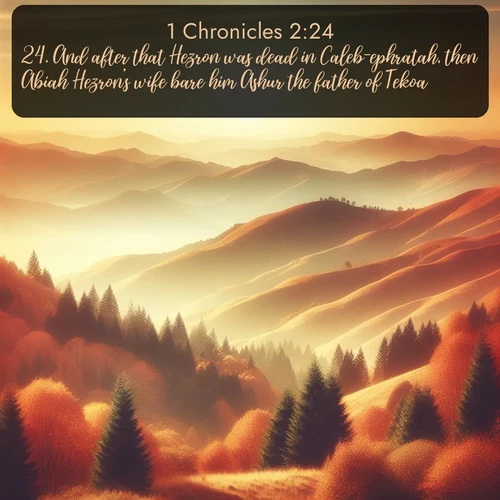1 Chronicles 2:24 plusieurs versions / traductions
English Bible Translations
24. And after that Hezron was dead in Caleb-ephratah, then Abiah Hezron's wife bare him Ashur the father of Tekoa.
24. And after that Hezron was dead in Caleb-ephrathah, then Abijah Hezron's wife bare him Ashhur the father of Tekoa.
24. And after the death of Hezron, Caleb had connection with Ephrath, his father Hezron's wife, and she gave birth to his son Asshur, the father of Tekoa.
24. And after the death of Hezron in Caleb-Ephratah, Abijah, Hezron's wife, bore him Ashhur, the father of Tekoa.
24. And after that Hezron was dead in Caleb-ephratah, then Abiah Hezron's wife bore him Ashur the father of Tekoa.
24. And after the death of Hezron in Caleb-Ephratah, then the wife of Hezron, Abijah, even beareth to him Asshur, father of Tekoa.
German Bible Translations
24. Nach dem Tode Hezrons in Kaleb Ephratha gebar Hezrons Weib Abia ihm Ashur, den Vater Thekoas.
24. Und nachdem Chezron gestorben war zu Kaleb-Ephrata, gebar ihm Abija, das Weib Chezrons, Aschchur, den Vater Tekoas.
French Bible Translations
24. Après la mort de Hetsron à Caleb-Ephrata, sa femme Abija lui donna Ashchur, qui fut le père de Tekoa.
24. Après la mort de Hetsron à Caleb-Ephrata, Abija, femme de Hetsron, lui enfanta Aschchur, père de Tekoa.
24. Après la mort de Hetsron à Caleb-Ephratha, Abija, femme de Hetsron, lui enfanta Aschchur, père de Tekoa.
24. Et après la mort de Hetsron, à Caleb-Éphratha, Abija, la femme de Hetsron, lui enfanta encore Ashkhur, père de Thekoa.
24. Et après la mort de Hetsron, lorsque Caleb vint vers Ephrat, la femme de Hetsron Abija lui enfanta Ashur père de Tékoah.
24. Après la mort de Hetsron, à Caleb-Éphratha, Abija, femme de Hetsron, lui enfanta Ashur, père de Thékoa.
Versions with Strong Codes
1 Chronicles 2 / KJV_Strong24. And after that[H310] Hezron[H2696] was dead[H4194] in Caleb-ephratah,[H3613] then Abiah[H29] Hezron's[H2696] wife[H802] bore[H3205] him[H853] Ashur[H806] the father[H1] of Tekoa.[H8620]
Strong Code definitions
H310 'achar akh-ar' from H309; properly, the hind part; generally used as an adverb or conjunction, after (in various senses):--after (that, -ward), again, at, away from, back (from, -side), behind, beside, by, follow (after, -ing), forasmuch, from, hereafter, hinder end, + out (over) live, + persecute, posterity, pursuing, remnant, seeing, since, thence(-forth), when, with.see H309
H2696 Chetsrown khets-rone' from H2691; court-yard; Chetsron, the name of a place in Palestine; also of two Israelites:--Hezron.see H2691
H4194 maveth maw'-veth from H4191; death (natural or violent); concretely, the dead, their place or state (hades); figuratively, pestilence,ruin:--(be) dead((-ly)), death, die(-d). see H4191
H3613 Kaleb 'Ephrathah kaw-labe' ef-raw'-thaw from H3612 and 672; Caleb- Ephrathah, a place in Egypt (if the text is correct):--Caleb-ephrathah.see H3612 see H672
H29 'Abiyah ab-ee-yaw' or prolonged Abiyahuw {ab-ee-yaw'-hoo}; from H1 and 3050; father (i.e. worshipper) of Jah; Abijah, the name of several Israelite men and two Israelitesses:--Abiah, Abijah.see H1 see H3050
H2696 Chetsrown khets-rone' from H2691; court-yard; Chetsron, the name of a place in Palestine; also of two Israelites:--Hezron.see H2691
H802 'ishshah ish-shaw' feminine of H376 or 582; irregular plural, nashiym{naw-sheem'}; a woman (used in the same wide sense as H582):--(adulter)ess, each, every, female, X many, + none, one, + together, wife, woman. Often unexpressed in English. see H376see H582&volume=KJV_strong' target='_self' >H582 see H582&volume=KJV_strong' target='_self' >H582
H3205 yalad yaw-lad' a primitive root; to bear young; causatively, to beget; medically, to act as midwife; specifically, to show lineage:--bear, beget, birth((-day)), born, (make to) bring forth (children, young), bring up, calve, child, come, be delivered (of a child), time of delivery, gender, hatch, labour, (do the office of a) midwife, declare pedigrees, bethe son of, (woman in, woman that) travail(-eth, -ing woman).
H853 'eth ayth apparent contracted from H226 in the demonstrative sense of entity; properly, self (but generally used to point out more definitely the object of a verb or preposition, even or namely):--(as such unrepresented in English). see H226
H806 'Ashchuwr ash-khoor' probably from H7835; black; Ashchur, an Israelite:--Ashur. see H7835
H1 'ab awb a primitive word; father, in a literal and immediate, or figurative and remote application):--chief,(fore-)father(-less), X patrimony, principal. Compare names in "Abi-".
H8620 Tqowa` tek-o'-ah a form of H8619; Tekoa, a place in Palestine:--Tekoa, Tekoah.see H8619
Prédications qui analysent les thèmes 1 Chroniques 2
Thèmes : Généalogies d'Israël; Descendance de DavidRelated Sermons discussing 1 Chronicles 2
Themes : Généalogies d'Israël; Descendance de Davidsee also: Bible Key Verses ; KJV Bible Images, BBE Bible images

